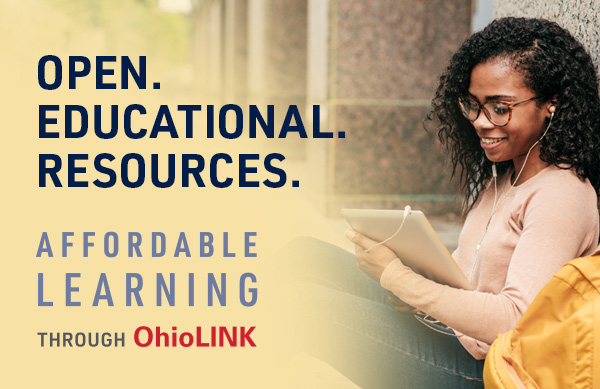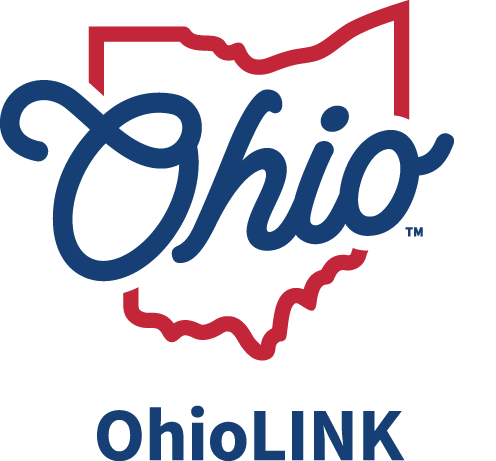OhioLINK is often able to use its unique position in the Ohio academic library community to spearhead initiatives that would collectively benefit members, as well as the library and information science profession. Click on the headings for a brief explanation of recent projects.
OhioLINK seeks to create and promote career opportunities in librarianship, information studies, and data sciences, and aims to identify and encourage candidates for Ohio’s libraries and library-related industries that are representative of the state’s population, while also encouraging and supporting local library efforts.
The OhioLINK Luminaries Program is one avenue through which OhioLINK collaborates with its member libraries to offer students a unique, paid opportunity in academic libraries not available in traditional internships or part-time campus employment.
As a resume-building position offering hands-on experience, the OhioLINK Luminaries students receive a broad introduction to the information studies profession—its purpose, value, and expertise. Students are paired with a mentor to gain valuable knowledge in the Libraries and Information Sciences field and develop marketable skills that are extendable to a variety of career disciplines. The program provides experiential learning, valuable training, and support within a professional and structured work environment, while also creating a network for current and former program participants.
The Luminaries Program exposes students to a wide range of work experiences based in the students' interests; creates a support system for students, mentors, and library administrators; and supports positive library work environments.
If your OhioLINK library is interested in learning more about participating in the Luminaries Program, please contact info@ohiolink.edu.
OhioLINK’s ILS Revisioning
OhioLINK’s Library Advisory Council (LAC) had been discussing dissatisfactions with the ILS status quo for years. Between 2014 and 2017, a market study and an RFI from ILS vendors confirmed that the situation was not ideal. In 2018, the Library Advisory Council Coordinating Committee (LACCC) formed the “Transforming the ILS” working group, which hired Ithaka S+R, a research consultant to libraries and universities, to lead strategic discussions. Workshops examined market consolidation, limitations, and explored potential new directions.
After many unenthusiastic discussions about ILS systems it became clear to the working group that any ‘next-gen’ ILS system—even those in development—weren’t going to offer enough return to make an investment worthwhile for this experienced group of library administrators.
Users had changed, collections had changed, libraries had evolved, but ILS platforms hadn’t. No products addressed the libraries’ role in providing services that supported teaching, affordable learning, and collaborative research. Systems still focused on primarily on print collections through centralized distribution, even though users overwhelmingly accessed content digitally. ILS vendors weren’t even talking about addressing the current situation, much less projecting what academic libraries’ needs might be in five to ten years.
We contemplated what the OhioLINK community could do to influence the market and encourage software development that deans and directors would be willing to invest in? Rather than issue a RFP, the group decided to articulate a new vision for the market.
The resulting white paper, It’s Not What Libraries Hold; It’s Who Libraries Serve—Seeking a User-Centered Future for Academic Libraries, outlines groundbreaking ideas for the academic library community and service providers, and is intended to generate discussion and spur innovation. Taking the lead, OhioLINK shared a vision for the future of the ILS.
The paper’s reception was very favorable, however, the pandemic refocused all discussion and activity on the impact COVID-19 has had on the OhioLINK community. The paper is an influential piece of thought leadership and we hope to return to these discussions on the future development of user-focused library systems.
For additional information, please see
Recenter Library Systems on the User: An Interview with OhioLINK’s Gwen Evans;
The Primacy of Print Is Past
OhioLINK's Affordable Learning Textbooks
OhioLINK’s Affordable Learning Initiative continues to assess how it can lower the cost of college for Ohio higher education students by identifying strategies to support Open Educational Resources (OER) textbook and course material adoption, and negotiating Inclusive Access agreements with publishers.
While OER results in biggest cost reduction for students, Inclusive Access agreements for textbooks scale faster to reduce costs for more students across more disciplines in more institutions. Rather than ‘either/or,’ data shows the value of a hybrid approach to affordable learning.
OhioLINK will continue to gather cost savings data. In addition, we are working to identify barriers to OER adoption and make recommendations for practical ways to address them. OhioLINK also will continue to negotiate and monitor inclusive access agreements with commercial textbook publishers as long as those agreements provide value to our students.
| Open Ed Collaborative OER Adoption | Inclusive Access Commercial Textbook Adoption | Totals | |
|---|---|---|---|
| Scope of Materials | American Government, Calculus I & II, Second Year Writing, Linear Algebra, Macroeconomics, Psychology, Sociology, Statistics | All disciplines and types of courses and enrollment levels | All disciplines, all levels |
| # of Students Affected | 19,597 | 73,540 | 93,137 |
| # of Institutions (some overlap between OER + inclusive access) | 12 | 53 | 53 |
| # of Courses | 10 (multiple sections of courses at 12 institutions) | 981 | 988 |
| Total Estimated Cost Savings | $3,643,770 | $10,607,879 | $14,251,649 |
| Average Savings Per Student | $186 - not that these students paid $0 for course materials while inclusive access still has a cost | $144 | n/a |
| Other | Range of prices of commercial texts replaced, from $19 (First Year Writing) to $279 (Calculus) |
For additional information, please see
Affordable Learning Requires a Diverse Approach, Part 1: Playing the Short Game (and the Long One) to Secure Savings for Students
An Update to OhioLINK’s Affordable Textbooks Initiative

